Related Research Articles

Baron Carl von Rokitansky, was a Bohemian physician, pathologist, humanist philosopher and liberal politician. Founder of science-based diagnostics.

Islam in Austria is the largest minority religion in the country, practiced by 8% of the total population in 2016 according to the Austrian Academy of Sciences. The majority of Muslims in Austria belong to the Sunni denomination. Most Muslims came to Austria during the 1960s as migrant workers from Turkey and Yugoslavia. There are also communities of Arab and Afghan origin.

The Free Workers' Union of Germany was an anarcho-syndicalist trade union in Germany. It stemmed from the Free Association of German Trade Unions (FDVG) which combined with the Ruhr region's Freie Arbeiter Union on September 15, 1919. The FAUD was involved in the revolution in Germany from 1918–1923, and continued to be involved in the German labor movement after the FAUD began to decline in 1923. After 1921, the FAUD added an "AS" to their name, signifying a full transition from simple syndicalism to anarcho-syndicalism. This also led to further difficulties between the intellectual elites of the FAUD (AS), such as Rudolf Rocker, and the rank and file workers, mostly in the Ruhr, who were more worried about "bread and butter" issues than anarchist political activities. These workers, the majority of the FAUD-(AS) members, formed the Gelsenkircherichtung within the movement, and given the movements federalist structure, began to drift away from the FAUD-(AS) intellectually and organizationally. Eventually, those workers who had joined during the revolution left the movement and the remaining FAUD-(AS) members came from the FDVG's original constituencies of the building trades and specialized textile workers. The Nazis suppressed the FAUD in January 1933 after coming to power. However, many of its members continued to do political work illegally and organized resistance against the Nazi regime, both in Germany and elsewhere. The International Workers' Association, of which the FAUD was a member, was founded upon the initiative of the German organization in 1922. The Free Workers' Union (FAU), which was founded in 1977, sees itself in the tradition of the FAUD. At its peak, the FAUD had 150,000 members. The primary organ of the FAUD was the newspaper Der Syndikalist, which was first published in December 1918, and continued until the groups suppression by the Nazis.

Andreas Joseph Hofmann was a German philosopher and revolutionary active in the Republic of Mainz. As Chairman of the Rhenish-German National Convention, the earliest parliament in Germany based on the principle of popular sovereignty, he proclaimed the first republican state in Germany, the Rhenish-German Free State, on 18 March 1793. A strong supporter of the French Revolution, he argued for an accession of all German territory west of the Rhine to France and served in the administration of the department Mont-Tonnerre under the French Directory and the French Consulate.
Prostitution in Austria is legal and regulated.

The Reichsbanner Schwarz-Rot-Gold was an organization in Germany during the Weimar Republic, formed by members of the Social Democratic Party of Germany, the German Centre Party, and the (liberal) German Democratic Party in February 1924. Its goal was to defend parliamentary democracy against internal subversion and extremism from the left and right, to compel the population to respect the new Republic, to honor its flag and the constitution. Its name is derived from the Flag of Germany adopted in 1919, the colors of which were associated with the Weimar Republic and liberal German nationalism.

Friedrich Stadler is an Austrian historian and philosopher and professor for history and philosophy of science at the University of Vienna. He is the founder and long-time director of the Institute Vienna Circle, which was established as a Department of the Faculty of Philosophy and Education of the Vienna University in May 2011. Currently he is a permanent fellow of this Department and serves at the same time as the Director of the co-operating Vienna Circle Society, which is the continuation of the former Institute Vienna Circle as an extra-university institution.
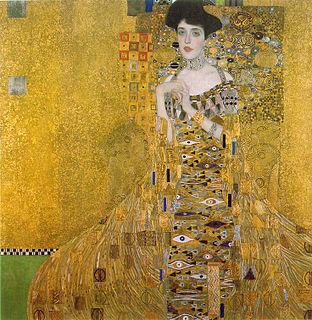
The legal position of women in Austria improved since the middle of the 1970s. With regard to women's rights, the priority in Austria is based on the equal treatment of both genders, rather than having equal rights only. Thus, Austrian women benefit from their government's attempt to compensate for gender-specific inequality of burdens. However, the concept of traditional roles, influenced by Roman Catholicism in Austria, is still prevalent within Austrian society.
Gesellschaft der Ärzte in Wien is a medical society with a long-standing tradition in Austria. Its principal task is the continuing education of medical practitioners. The society's headquarter is the Billrothhaus in the 9th district of Vienna.
Johanna Goldschmidt was a German social activist, writer and philanthropist. She played an important role in supporting Friedrich Fröbel and in spreading the concept of the "kindergarten".

Karoline von Perin-Gradenstein, née von Pasqualati, was an Austrian revolutionary and suffragette.
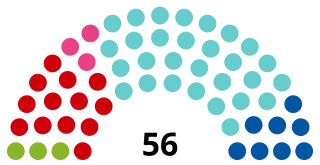
The Landtag of Lower Austria is the state parliament of the Austrian state of Lower Austria. It exercises the state legislation (legislature). The seat of the Landtag is in St. Pölten in the Landhausviertel.
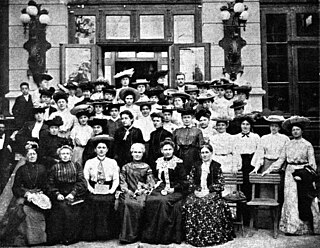
The Allgemeiner Österreichischer Frauenverein was an Austrian women's organization for women's suffrage, active between 1893 and 1919.
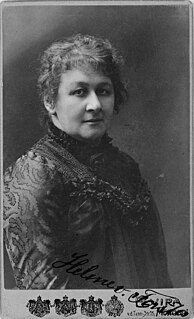
Helene von Forster was a German women's rights activist and author. She is considered the most important representative of the feminist movement's moderate "bourgeois" wing in Nuremberg.

Marie Lang was an Austrian feminist, theosophist and publisher. Born in 1858 in Vienna, Lang was raised in a liberal, upper-middle-class home. After divorcing her first husband in 1884, she married Edmund Lang and the two hosted an influential salon for politicians and intellectuals. Joining the women's movement toward the end of the 1880s, she quickly became an influential women's rights activist. In 1893, along with Auguste Fickert and Rosa Mayreder, she founded the Allgemeiner Österreichischer Frauenverein. In spite of provisions in Section 30 of the law governing associations, which prohibited women's political involvement, the three friends used their networks of influential politicians and intellectuals to press for legal changes in laws governing women and children's civil rights and in favor of women's suffrage. In 1898, she co-founded the women's journal Dokumente der Frauen, serving as its editor-in-chief until 1902.

The Alte Rathaus is a building in central Vienna, located at Wipplingerstraße 8, 1st District.
Julie Bassermann was a German women's rights activist.
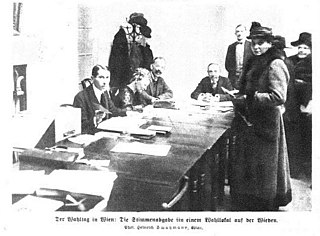
Women's suffrage was introduced in Austria on 12 November 1918 with the foundation of the Republic of Austria after the fall of the Habsburg monarchy with the end of World War I. While men had gained the right to vote in the years of 1861 until 1907, women were explicitly excluded from political participation since the February Patent in 1861.

Malkasten is a progressive German artists' association, founded in Düsseldorf in 1848, during the March Revolution. Since 1867, their headquarters have been in the Pempelfort district.
Hans Hirsch was an Austrian academic who worked between 1903 and 1914 on the vast "Monumenta Germaniae Historica" sources project, and subsequently became a full-time professional historian. He accepted an ordinary (full) professorship in History at the German University in Prague as the war ended, transferring in 1926 to the University of Vienna. The focus of his research and teaching was on Medieval History. In parallel he built for himself a reputation as a specialist on the "Sudeten Germans", which marked him out as a more than averagely politicised historian. His application for party membership was still outstanding at the time of his death, however.
References
- ↑ "Erster Wiener Demokratischer Frauenverein". Wien Geschichte Wiki (in German). Stadt Wien (City of Vienna). Retrieved 25 July 2020.
- ↑ "Wiener demokratischer Frauenverein". Frauen in Bewegung 1848–1938 (in German). Österreichische Nationalbibliothek . Retrieved 25 July 2020.
- 1 2 Sperber, Jonathan, ed. (1980). "Frauenaktivismus in der Revolution von 1848/49: Statuten des ersten Wiener demokratischen Frauenvereins (1848); Aktionen des Vereins (1850); Petition zur Einberufung des Landsturmes (16. Oktober 1848)". Vom Vormärz bis zur Preußischen Vorherrschaft (1815-1866) (in German). Deutsche Geschichte in Dokumenten und Bildern. Retrieved 25 July 2020.